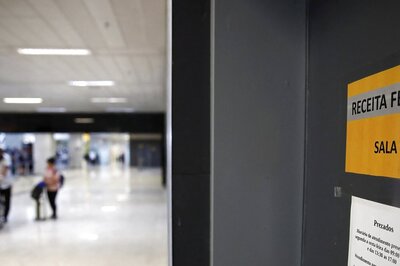
views
The question on every mobile phone user’s mind is — When will 5G services be launched in India? According to the Department of Telecommunications (DoT), the services will be available in 2022.
The DOT also announced that 5G services will be offered in 13 Indian cities first, following which it will be made available in the remaining cities.
Ahmedabad, Bengaluru, Chandigarh, Gandhinagar, Gurugram, Hyderabad, Jamnagar, Kolkata, Chennai, Lucknow, Pune, Delhi and Mumbai are among the 13 cities that will receive 5G services, according to the telecommunications department.
News18 spoke to Nitin Bansal, MD, India & Head-Networks, Southeast Asia, Oceania and India at Ericsson, about the upcoming 5G services and India’s digital future.
Edited Excerpts:
Why do we need 5G?
5G will unlock the next level of economic growth in India. Initially, 5G will help communication service providers manage the growing data needs of consumers more efficiently. According to Ericsson’s economic study of enhanced mobile broadband, evolution to 5G will enable 10 times lower cost per gigabyte than the current 4G. Enhanced mobile broadband (eMBB) and fixed wireless access (FWA) are expected to be the early use-cases for 5G in India which will help address the concern of the limited fixed broadband penetration levels in the country and improve the data experience while on the move. 5G, with its characteristics of ultra-low latency, enhanced capacity and reliability, will enrich the end-user experience. For instance, 4K video on a smartphone, AR/VR and mobile gaming applications will benefit from 5G capabilities such as ultra-low latency and ultra-high reliability for an enhanced user experience.
5G will not only enable the operators to manage the growing data needs of consumers more efficiently, but also help open new revenue streams for them. Across the world, 5G is already transforming industries by kickstarting the fourth industrial revolution and by enriching the network experience for various businesses and end consumers. We expect 5G to enable the digital transformation of sectors such as manufacturing, healthcare, energy and utilities, public safety, automotive, education and many more in India. In fact, as per Ericsson’s report ‘5G for business: a 2030 market compass study’, the projected value of the 5G-enabled digitalisation revenues in India will be approximately USD 17 billion by 2030.
How soon are consumers willing to shift to 5G? Are we ready to pay a premium for 5G services?
According to the Ericsson consumer lab study, 40 million smartphone users are estimated to take up 5G in the first year of it being made available in the country, along with the willingness to pay a premium for new 5G capabilities. Consumers are even willing to pay 50% more for 5G plans with bundled digital services, compared to just a 10% premium for 5G connectivity. Furthermore, Indian users have shown the biggest rise in their intention to upgrade, with 67% wanting to take up 5G once it is available, an increase of 14 percentage points over 2019.
The Ericsson Mobility Report (November 2021) reveals that 5G will represent around 39% of mobile subscriptions in India at the end of 2027, estimated at about 500 million subscriptions.
What should be the roadmap to develop robust 5G connectivity in India?
A robust 5G connectivity will require an adequate spectrum across all bands at reasonable prices. Given the ‘long-term benefits’ that 5G technology will bring to India, it needs to be viewed as a critical infrastructure and the foundation on which the ‘Digital India’ vision can be realised.
How will it bridge the digital divide in the country?
With the benefits of 4G services being availed by consumers even in remote corners of India, we can’t underestimate the importance of broadband and connectivity for the social and economic development of the country. In fact, the pandemic has underscored the importance of connectivity in every sphere of our lives — from enabling working from home and online education to bringing businesses online and connecting people. The Indian Government’s ‘Digital India‘ programme, which focuses on empowerment, inclusion and digital transformation rely heavily on connectivity as its foundation and the mobile networks in India continue to deliver on that promise.
Last year, Ericsson conducted India’s first Rural 5G trial, in partnership with Airtel, which showcased the massive potential offered by 5G towards bridging the digital divide by enabling access to high-speed broadband through solutions such as enhanced mobile broadband (eMBB) and Fixed Wireless Access (FWA) services.
Has India delayed the 5G auction too much?
Looking at other markets that have rolled out 5G, India is not behind. With the spectrum auction scheduled in mid-2022, the 5G rollout can be expected by the second half of the year. From a consumer perspective, there is high interest for 5G in India, with consumers willing to pay a premium for the new 5G capabilities. Given the robust mobile broadband penetration and the government’s focus on digitalisation, India is well poised to reap the long-term socio-economic benefit of the technology.
What is your view on Trai’s recommendation to slash the base price of 33-36 GHz bands and 700 MHz bands?
We welcome the reduction of spectrum prices by 35-40%.
However, given that 5G would require a lot of spectrum, it is critical that a large contiguous spectrum across all bands is made available to operators at affordable prices to ensure smooth deployment of 5G.
What about Ericsson’s global 5G deployment experience and the consumers’ response?
Our global 5G deployment experience across 121 live networks enables us to help Indian operators seamlessly evolve from 4G to 5G. Some of the global use cases we deploy across other markets can be adapted and introduced in India. We are witnessing a rapid adoption of 5G in markets where it is live. In 2019, we partnered with SK Telecom, the largest mobile operator in South Korea, to switch on its commercial 5G network in the world’s fastest-growing 5G market.
We also partnered with Telstra, Australia’s largest mobile network provider, to roll out and activate 5G in 10 cities in the same year. Early users were able to experience better network coverage even in underground and overpopulated areas while advanced technologies such as AR and VR are being utilised for diverse use cases powered by the speed and low latency of 5G.
India is well-positioned to deploy 5G once the spectrum becomes available this year to meet the country’s growing data demand and drive digitalisation.
How is Ericsson supporting Indian telecom operators in the digital transformation journey?
In India, we have been testing and developing several 5G use cases relevant to the country with our operator and academic partners. The various 5G field trials conducted successfully have set the stage for the roll-out of 5G services in the country. To that effect, Bharti Airtel and Ericsson demonstrated India’s first 5G live network in Hyderabad and trials in Gurugram and Manesar. This was followed by a demonstration of India’s first 5G rural trial in Bhaipur Bramanan village on the outskirts of Delhi/NCR. Ericsson also partnered with Vodafone Idea Ltd. (VIL) to showcase the power of 5G to help healthcare reach remote parts of the country. The telco also demonstrated blazing speeds of 4 Gbps in November as part of the trial.
We have also launched advanced products such as an intelligent automation platform, time-critical communication for real-time 5G experiences and 5G RAN Slicing solutions to support end-to-end network slicing support, and Radio 4490 — a dual-band radio that delivers 25% lower power consumption. Furthermore, Ericsson’s Radio System hardware has been 5G-ready since 2015, enabling operators to upgrade to 5G with a remote software installation. Ericsson is also working closely with all Indian operators and continues to engage with them on their network evolution plans.
Read all the Latest Tech News here


















Comments
0 comment